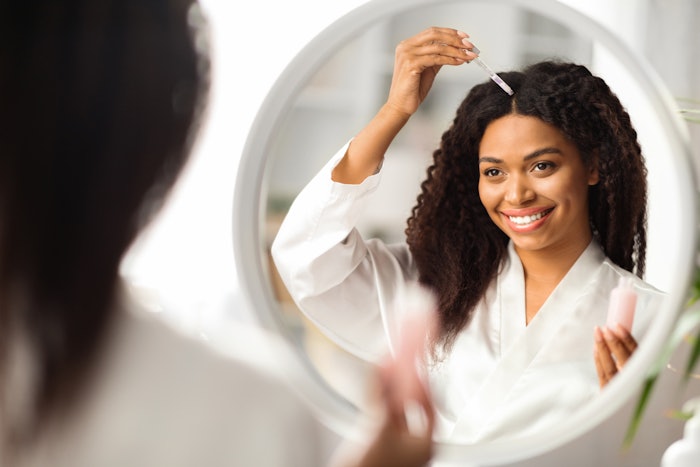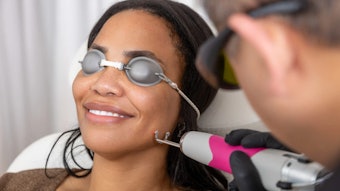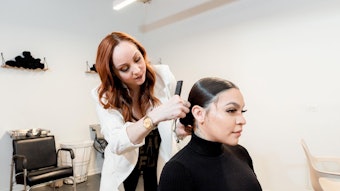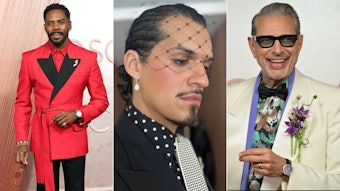
Hair loss affects over 50 million men and 30 million women in the US alone, and in a recent Beauty Launchpad poll, 83% of our audience shared that they had clients who were experiencing hair loss. The issue has become an increasing concern for clients, who are in search of ways to help their hair grow. According to July data from Spate, there are 1.3 million “hair growth” online queries each month in the United States alone. A recent Cosmetify survey found that top online hair searches include “how to grow hair faster” and “why is my hair falling out.” To help provide some answers, Beauty Launchpad reached out to the experts for their must have product recommendations in the salon and at-home to address hair loss, ingredients to look out for to help maintain hair growth and steps to take to properly care for the hair.
What should stylists tell their clients about hair loss?
Hair loss can occur for a variety of reasons, whether it be from basic shedding to an autoimmune issue. But, it could be likely that hair growth is being halted by poor scalp conditions.
"Most common signs of an unhealthy scalp include dryness, itchiness, oiliness and flaking," explains Jordan Kindel, Truss Professional Brand Specialist. "An unhealthy scalp is caused by many different factors: anything from stress, underlying disease, diet, illness or the most common factor, which is overusing hair products."
According to Richelle Lizarraga, Associate Director of Brand Education for Nioxin, healthy hair begins at the scalp! For this reason, proper scalp care is critical. This starts in the salon with the products you use and the steps you recommend to clients for at-home care. Once a routine is in place, clients will hopefully start to see the hair growth they are looking for.
What are must-have products for scalp care?
If you have a client that is struggling with hair loss or has poor scalp health, it's important to have proper products in the salon to help care for their hair needs.
"Some of the essential products I recommend for every stylist to use on their clients are Scalp Renew Dermabrasion Treatment, Nioxin Diamax Advanced Hair Thickening Serum and Nioxin Volumizing Dry Shampoo," Lizarraga recommends. "Scalp Renew is an in-salon treatment that deep cleans the scalp. This is a service you can offer in your salon that only takes 10 minutes and makes the scalp feel totally invigorated. Nioxin Diamax Advanced is a hair thickening serum that can be misted over the root area before blow drying, and it gives the appearance of 11,000 more hair strands. Who wouldn’t want that? Finally, you may be wondering why I’d recommend a dry shampoo. Well, most folks who want thicker, fuller hair use dry shampoo to make their blowouts last longer and avoid daily cleansing. One of the great things about Nioxin’s Volumizing Dry Shampoo is that is was designed for folks with scalp and hair concerns. It absorbs oil for lightweight volume and doesn’t stick to the scalp or leave behind nasty residue. It’s a super refreshing dry shampoo that gives up to 2x fuller hair instantly."
Once you finish scalp care at the salon, it's critical that clients continue the process at-home. So, what products should you have in stock to recommend for their at-home use?
"I recommend starting with power treatments that’ll allow your clients to dip their toes into a hair care routine. For example, a great duo is Nioxin Ultimate Power Serum and Hair Fall Defense Shampoo," Lizarraga shares. "Ultimate Power Serum is infused with incredible ingredients to grow stronger hair from the root and anchor the hair that you do have. In fact, folks who use it see less hair in their brushes and less breakage overall, and you can amplify effects by adding the shampoo for up to 1.5x the results. These two products are super easy to use because you can replace the shampoo you’re currently using, then simply mist the serum over your scalp, and you’re ready to go!"
What are the best ingredients for hair growth?
The beauty industry has started to make a shift, with professionals and clients wanting transparency and clarity from their favorite pro beauty brands. This starts with knowing what ingredients are included in the products they use in the salon and at-home. When it comes to hair growth, there are several key ingredients to look out for.
Recently, batana oil has been trending on social media in relation to its benefits for hair growth. A yellow liquid extracted from the nut of the American palm tree, batana oil is rich in Vitamins A and E, which helps promote a healthy scalp and hair follicle. The oil also contains antioxidants to reduce stress on the scalp and increase hair count, leading to a fuller head of hair.
Lizarraga shares some other must-have ingredients in the hair products you use: "Some key ingredients to look for are niacinamide to nourish the hair root, caffeine to maintain the skin barrier, biotin to stimulate hair growth and lauric acid to penetrate the hair roots. If you’re looking to really anchor the hair you have and avoid hair fall, I also recommend seeking out sandalore, which can stimulate hair follicles."
What are steps clients should take at home to care for their scalp?
While the right products and ingredients are essential to ensuring scalp health and helping the hair to grow, it's necessary to have a proper hair care routine. So, what should stylists advise clients to do at home to help with hair growth?
"I recommend for my clients to use a clarifying shampoo once a month to remove any build up or residue from the scalp," shares curly hair expert Brenda Taveras. "This is essential because we are constantly applying products throughout the week. Removing that build up and residue is like a restart for our hair. I always recommend that clients moisturize their hair right after and use a hair mask once a week for best results."
When it comes to how you treat the hair, Lizarraga advocates for kindness!
"The first step is simply treating your hair with kindness," she says. "Use a silk pillowcase at night to protect hair from friction and tangling, use a wide-tooth comb to gently detangle damp hair as wet tresses are ultra delicate. These are just a few ways to avoid breakage so hair can grow. In addition to a gentle hand, routine is king when it comes to hair growth! It’s important for clients to find a simple hair care regimen that they can integrate into their existing routines."
It's important to advise clients to not sleep on wet hair, as it is more fragile and prone to breakage. Moist environments can also cause bacterial infections. If a client is going to shower before bed, make sure to tell them to blow dry the root area to protect the scalp.
Additionally, clients wanting to prioritize hair growth or who are struggling with hair loss as a result of poor scalp health should stay away from tight, restrictive hairstyles that can pull on the scalp and cause damage over time.
A healthy scalp means healthy hair!
Healthy hair begins at the scalp, so it's important for clients who are struggling with hair loss or looking to prioritize hair growth take care of their scalp with a proper hair care routine. As a stylist, make sure you have products in the salon and behind your backbar you can share with clients who are looking to address those concerns.











